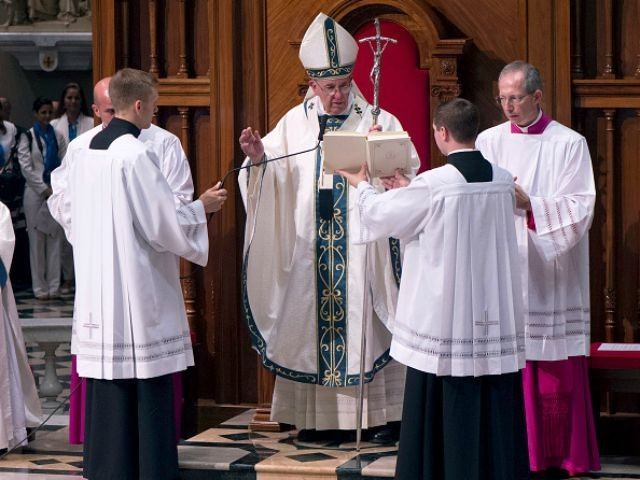Pope Francis is reminding Americans of the centrality of religious liberty in their lives. During an address in the evocative venue of Philadelphia’s Independence Park, the pontiff called the park “symbolic of the American way.”
The Pope also called religious freedom a “fundamental right” and declared that people of faith “remind American democracy of the ideals for which it was founded, and that society is weakened whenever and wherever injustice prevails.”
“In a world where various forms of modern tyranny seek to suppress religious freedom, or try to reduce it to a subculture without right to a voice in the public square, or to use religion as a pretext for hatred and brutality, it is imperative that the followers of the various religions join their voices in calling for peace, tolerance and respect for the dignity and rights of others,” he said.
The Pope also underscored the essential distinction between true religious freedom and a watered down “freedom of worship,” which would take religion out of public life and confine it within church walls.
“Religious freedom certainly means the right to worship God,” Francis said. “But religious liberty, by its nature, transcends places of worship and the private sphere of individuals and families.”
“Our various religious traditions serve society primarily by the message they proclaim;” Francis said. “They call individuals and communities to worship God, the source of all life, liberty and happiness.”
“They remind us of the transcendent dimension of human existence and our irreducible freedom in the face of every claim to absolute power.”
Referring to the atheistic totalitarianisms of National Socialism in Germany and Marxist Communism in the Soviet Union and elsewhere, Francis denounced utopian attempts to create perfect societies devoid of God and human freedom.
“We need but look at history, especially the history of the last century,” he said, “to see the atrocities perpetrated by systems which claimed to build one or another earthly paradise by dominating peoples, subjecting them to apparently indisputable principles and denying them any kind of rights.”
“Our rich religious traditions seek to offer meaning and direction,” Francis said. “At the heart of their spiritual mission is the proclamation of the truth and dignity of the human person and human rights.”
The Pope said that religions “have the right and the duty to make clear that it is possible to build a society where a healthy pluralism which respects differences and values them as such is a precious ally in the commitment to defending human dignity.”
Francis said that his visit to Independence Mall, “the birthplace of the United States of America,” was one of the highlights of his trip to the United States. “It was here,” he said, “that the freedoms which define this country were first proclaimed.”
“The Declaration of Independence stated that all men and women are created equal, that they are endowed by their Creator with certain inalienable rights, and that governments exist to protect and defend those rights,” Francis said.
“Those ringing words continue to inspire us today, even as they have inspired peoples throughout the world to fight for the freedom to live in accordance with their dignity,” he said.
But Francis also warned the immense crowd that religious liberty is never completely safe and must always be defended.
History, he said, “shows that these or any truths must constantly be reaffirmed, re-appropriated and defended. The history of this nation is also the tale of a constant effort, lasting to our own day, to embody those lofty principles in social and political life.”
Yet, “when a country is determined to remain true to its founding principles, based on respect for human dignity, it is strengthened and renewed,” he said.
The Pope ended his address with an appeal to vigilance: “And may you defend these rights, especially your religious freedom, for it has been given to you by God himself,” he said.
The question of religious freedom has emerged as a central theme in the Pope’s overall message during his visit to the United States, with references to it in nearly every single speech the Pope has made, including his address to the United Nations on Friday.
In his speech at the White House Wednesday morning, the Pope called religious liberty “one of America’s most precious possessions.”
He also made explicit reference to the concerns of U.S. conference of Catholic bishops, backing in this way their efforts to secure religious exemption for citizens and groups that find themselves required to act against their moral conscience.
The Pope also visited the Little Sisters of the Poor, a community of nuns who have been engaged in a major legal battle against the Obama administration’s HHS contraception mandate.
Papal spokesman Father Federico Lombardi told reporters that the Pope met with the religious sisters as “a sign of support” for them in their lawsuit against the Obama administration.
Follow Thomas D. Williams on Twitter @tdwilliamsrome

COMMENTS
Please let us know if you're having issues with commenting.